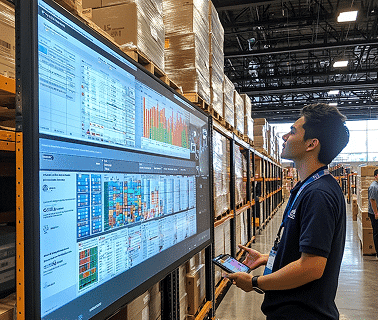Listen to this blog
Supply chain risk management is a process that helps identify, evaluate, prioritize, and mitigate the risks associated with a company’s supply chain. Businesses can use this process to protect themselves from business-related disasters such as cyber-attacks, supply chain disruptions, and product recalls.
For a company to effectively manage its supply chain risks, it must have a solid understanding of the following risks that can affect it:
- Financial risk is potential losses due to market conditions or interest rate changes.
- Operational risk refers to losses due to errors in the supply chain risk management plan or execution of activities.
- Legal risk refers to losses due to lawsuits or other legal issues related to an organization’s business practices.
Supply chain risk management can help companies prepare for these events and minimize their impact on revenue streams.
This blog on top trends in supply chain management will help you understand the current trends in the domain.
What is supply chain risk management?
Supply chain risk management is the process of evaluating and mitigating risks involved in the production and distribution of products. There are three main types of supply chain risk: financial, reputational, and operational.
- Financial risks include things like fraud and theft.
- Reputational risks include customer dissatisfaction and damage to brand equity.
- Operational risks include environmental damage or worker safety concerns.
Supply chain risk management can be viewed as an extension of corporate governance that focuses on internal controls (such as IT security) and external controls (such as auditing).
The process of risk management begins with the following:
- Identifying the risk
- Analysis
- Prioritizing
- Treatment
- Monitoring
- Documenting the results
Types of supply chain risks
Many types of supply chain risks can take time to keep track of. The most common types of supply chain risks include:
- Financial risks
Financial risk is the most common supply chain risk. It can be caused by a business’s inability to pay for the goods it purchases, currency fluctuations, price volatility, inflation, and changes in interest rates.
To solve this risk, businesses must ensure they have enough funds to avoid borrowing money from another source or otherwise running into financial trouble.
The most common forms of financial risk include the following:
- Credit risk
- Interest rate risk
- Liquidity risk
- Legal risks
Legal risk is the risk that a supply chain will be exposed to legal claims. It can include the following:
- Product liability claims
- Defective products
- Breach of contract
- Patent infringement
- Bad business practices
- Environmental risks
Environmental risk is a term that describes the potential for harm to human or environmental health associated with a product’s production, use, storage, and disposal.
There are many types of environmental risks associated with supply chain activities. For example, the smoke released by processing raw materials can affect the environment. Another environmental risk that can occur during the transportation is spoilage or contamination due to improper packaging.
- Socio-political risks
Socio-political risk is the possibility of a political conflict or a social movement causing disruptions to supply chains.
Socio-political risk can be mitigated by ensuring that risk mitigation strategies are in place, such as having an emergency plan, having senior leadership involved with planning, and having contingency plans for unexpected events.
- Project organization risk
The risk is that a project will be delayed or not meet its schedule or budget.
The primary causes of project organization risk are:
- Inadequate supply chain risk management plan and preparation
- Lack of resources or personnel
- Poor communication between teams
- Unrealistic expectations about project duration
Supply chain risk management strategies
Supply chain risk management strategies are the best way to mitigate potential supply chain disruptions. These strategies include:
- Using Big Data
One of the strategies for managing the supply chain process is using Big Data. It describes a broad range of data collected from various sources that can be analyzed for insights about a given business.
Some examples are:
- Using sensors to collect data about temperature and moisture levels in warehouses
- Digitizing documents related to trade transactions and storing them electronically
- Identifying patterns in customer behavior based on purchase history
- Tracking inventory levels across different stores
Want to know how to use blockchain in SCM? Check out our blog on blockchain and SCM for more detailed information.
- Upgrading Cybersecurity
Cybersecurity is one of the supply chain risk management strategies. It is a process of protecting an organization from cyber attacks, which may cause damage or loss of data or information.
Cybersecurity can be achieved by implementing appropriate measures, such as:
- Establishing policies and procedures for ensuring information systems’ confidentiality, integrity, and availability
- Adequate access controls to their systems, including passwords and user identification credentials
- Implementing continuous monitoring programs to detect unauthorized activity
- Track Freight Metrics
Track freight metrics are a way to track your freight deliveries and ensure they arrive on time. It involves tracking a shipment progress from when it leaves the warehouse until it arrives at its destination. This can be done using bar codes, RFID tags, and GPS tracking technology.
- Using Supply Chain Software
The use of supply chain software is one of the best supply chain risk management strategies. It tracks inventory levels, shipping times, and other key parameters to help companies reduce costs and streamline operations. Supply chain software is also a way to improve communication among different departments within an organization.
Want to know the scope of supply chain management in different industries? Check out our detailed blog on SCM and Industry 4.0 for more information.
Supply chain risk management tools
Supply chain risk management tools can help companies identify and mitigate risks before they hurt the company’s supply chain. This section will look at available tools for supply chain risk management.
- One Trust GRC
- Seclore Cloud Data Security
- UpGuard
- Descartes Denied Party Screening
- Secure Frame
- BitSight Security
- Venminder
- LogicGate Risk Cloud
- Whistic
- SecurityScorecard
- CyberGRX
- Process Bolt
You may like to know the highest-paying jobs in the supply chain domain.
Supply chain job roles and salaries
| Job roles | Salaries offered |
|---|---|
| Production Planner | INR 11.8 LPA |
| Logistics Resource Planner | INR 12.5 LPA |
| Production Manager | INR 23 LPA |
| Maintenance Supervisor/Manager | INR 6.5 LPA |
| Quality Manager | INR 19.9 LPA |
| Purchasing Manager | INR 18 LPA |
| Warehouse Manager | INR 13 LPA |
| Purchasing & Inventory Controller | INR 9.6 LPA |
| Procurement Specialist | INR 12 LPA |
Conclusion
At Online Manipal, you can pursue a PGCP in Logitstics & Supply Chain Management from Manipal Academy of Higher Education (MAHE) and online MBA with Supply Chain Management elective from Manipal University Jaipur (MUJ). These online programs are designed to give you an understanding of the risks in your supply chain and how to mitigate them. The course covers inventory management, transportation logistics, financial management, supply chain management policy implementation, and compliance issues.
It will give you the tools necessary to manage your supply chain effectively to meet your company’s goals while staying within budget. Furthermore, the course will also help you become an in-demand supply chain manager throughout your professional life.
Key takeaways:
- Risk management is a collaborative process that involves input from people across the supply chain, including customers, suppliers, and other stakeholders.
- The risk management approach for handling supply chains involves identifying risks along the entire value chain and assessing their likelihood of occurrence and severity (for example, financial loss).
- Risk management allows companies to identify weak links in their network so that they can focus their efforts on improving them. The ultimate goal is to make the entire supply chain as strong as possible.
Prepare for your next career milestone with us







